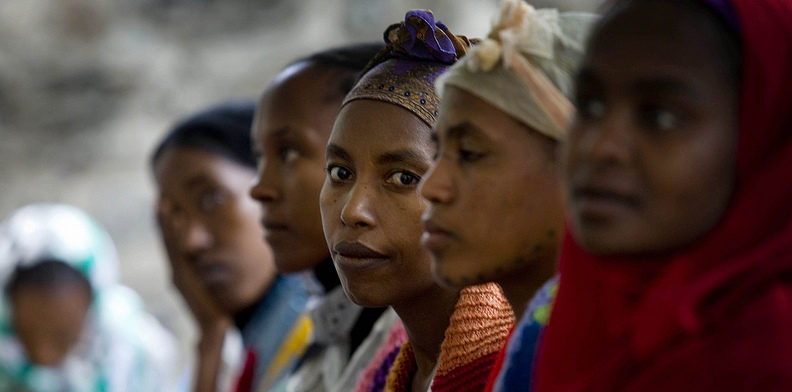WPHF is channeling urgent financing to community-based and women’s groups in Ethiopia to protect rights, respond to SGBV in crises settings and lead inclusive and gender-sensitive humanitarian action.
Call for Proposals on Food Security
Our Work
In Ethiopia, WPHF is enhancing the capacity of women’s organizations to raise community awareness of SGBV prevention and response measures — particularly among young women and girls, who bear the brunt of sexual violence — and strengthen women’s and girls’ resilience on the front lines.
WPHF is aiming to support women’s groups in Ethiopia to promote women’s leadership in humanitarian action and local decision-making, as well as provide gender-sensitive humanitarian response to women and girls across the country.
Our Partners
WPHF is supporting four projects implemented by 11 women-led and women’s rights civil society organizations in Ethiopia:
- Women’s Association of Tigray (WAT) on a project to improve its own institutional performance to adapt to the crisis and continue its operations by developing new resource mobilization strategies, a crisis response strategy, procurement of office equipment; and by covering the salaries of core staff.
- Mothers and Children Development Organization (MCDO) — together with Initiative for Peace and Development, Ethiopian Civil Society Forum, and Non-State Actors Coalition — on a project to i) enhance the participation and leadership of women in humanitarian crisis planning and response through community dialogues, consultations, awareness raising events, and social media campaigns; and ii) strengthen community-based women’s organizations to ensure women’s participation and benefits in humanitarian action and peacebuilding initiatives.
- Good Samaritan Association (GSA) on a project to protect internally displaced women and girls survivors of violence by enhancing access to holistic rehabilitation and reintegration services through the provision of temporary protection shelter for survivors; psychosocial support counseling; trainings on post-trauma counseling, business, and life skills; health education; in-kind support for women-headed households; and capacity-building for local women’s rights CSOs to better serve survivors.
- Eur¡ka Yebego Adragot Dirigit (Eurika) — together with Efratana Gidim, Antsokiana Gemza, Menz Gera, and Menz Mama — on a project to provide assistance and recovery services to SGBV survivors among internally displaced populations and host communities through the establishment of a safe house, the consolidation of referral pathways and support provision, and the enhancement of SGBV prevention and preparedness through awareness-raising and capacity building of women’s associations.
Background
The Northern Region of Ethiopia has been plagued by armed conflict since early November 2020. In addition to displacement caused by the intensification and expansion of the conflict from the Tigray region to Amhara and Afar region, ongoing inter-communal tensions and regional border disputes are another main driver of humanitarian and protection needs. The trend of displacement has increased over the last three years from the 3.2 million internally displaced persons (IDPs) recorded in 2018 to 4.3 million at the end of 2021. Mounting insecurity has limited humanitarian access and the ability to deliver life-saving assistance to affected regions.
Women and girls have been directly and profoundly impacted by the conflict in Ethiopia and constitute the majority of IDPs and survivors of SGBV. The conflict further exacerbated the existing vulnerabilities of women and girls affected by crises and contributed to additional risks of violence, exploitation, and abuse. Among them, young women and girls have experienced the brunt of sexual violence during the conflict.
Notwithstanding, timely and adequate services for survivors of violence are lacking, and women’s and girls’ needs have not been systematically prioritized in the humanitarian response and programming, despite women’s organizations’ crucial role in driving, advocating, and delivering gender-sensitive humanitarian and disaster response and empowering other girls and women in the process. This has further contributed to exacerbating the conflict and the vulnerabilities of women and girls.
On top of these challenges, consecutive years of drought in Ethiopia’s southern regions have worsened food insecurity and further increased the threats facing women and girls. The socioeconomic impacts of COVID-19, coupled with women’s unequal economic participation, exclusion and discrimination, are also contributing to high levels of acute humanitarian need and lack of protection among the most vulnerable. In this challenging situation, progress achieved on women’s livelihoods, rights, gender equality and the development of the country is at stake in Ethiopia.
Our Vision
In Ethiopia, WPHF aims to ensure the financing and coordination of local civil society organizations working to support and strengthen the critical roles played by women activists and localwomen’s groups in humanitarian and crisis response and the protection of women and girls, contributing to the realization of sustainable peace and equality across the country.
